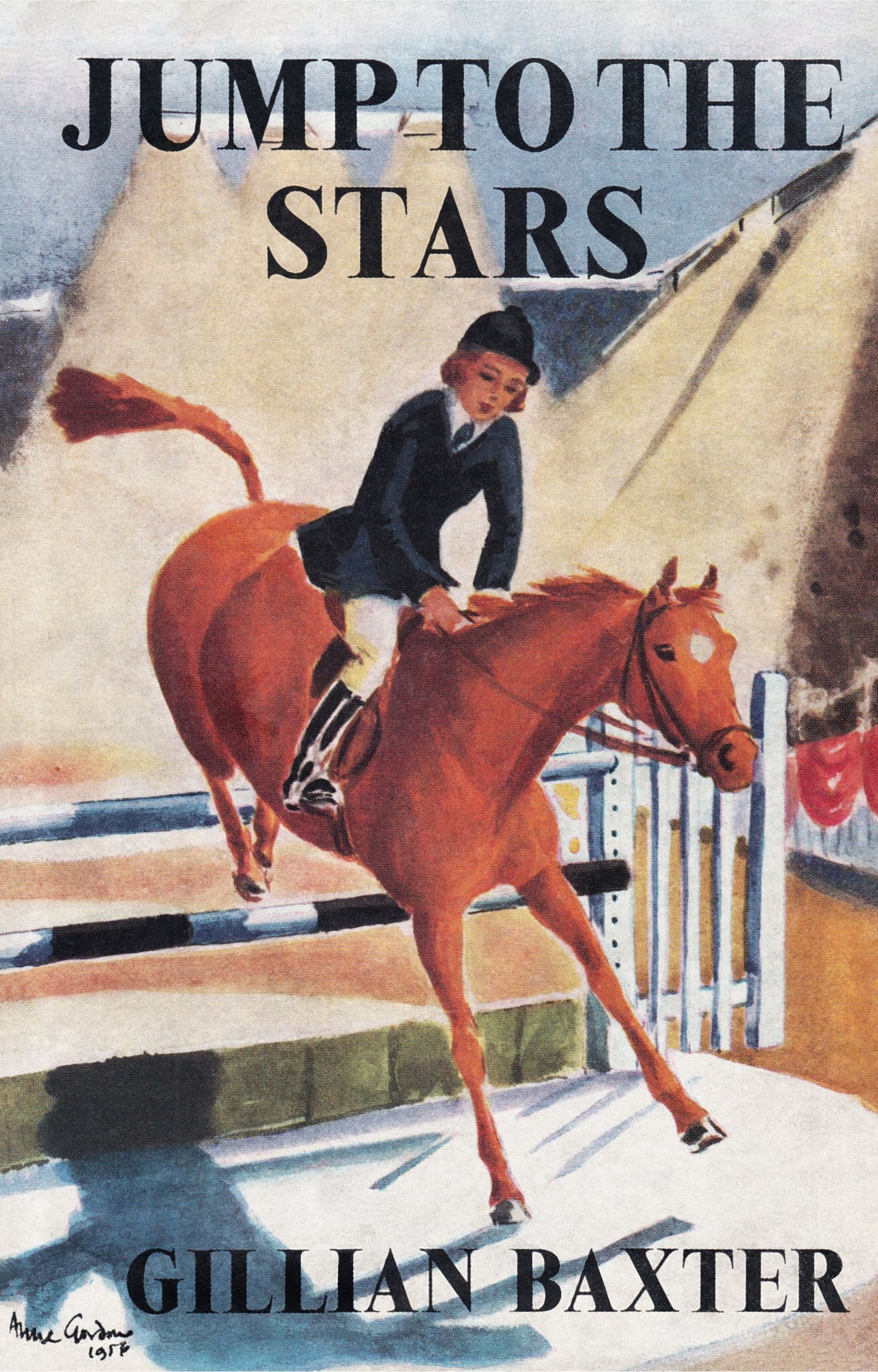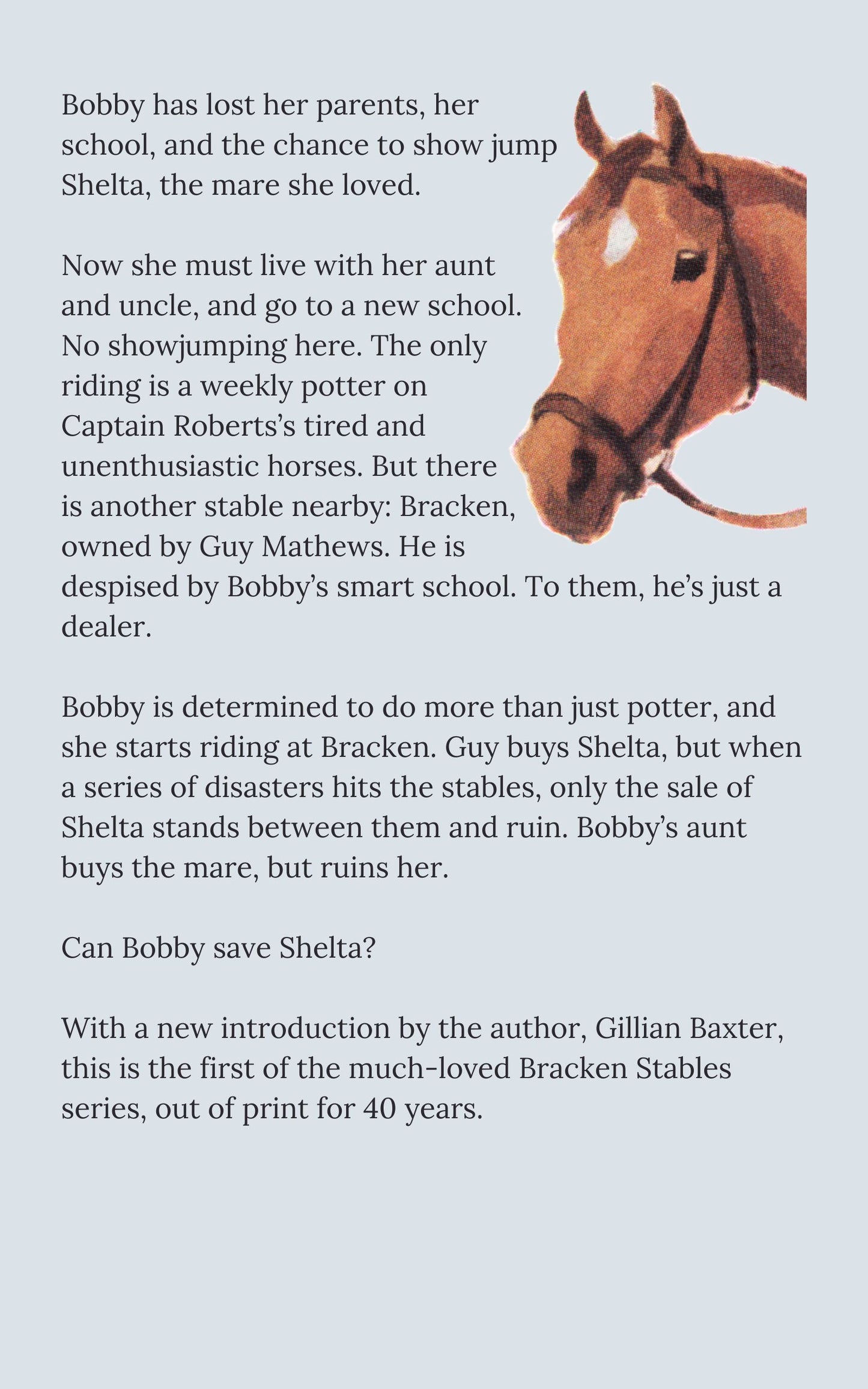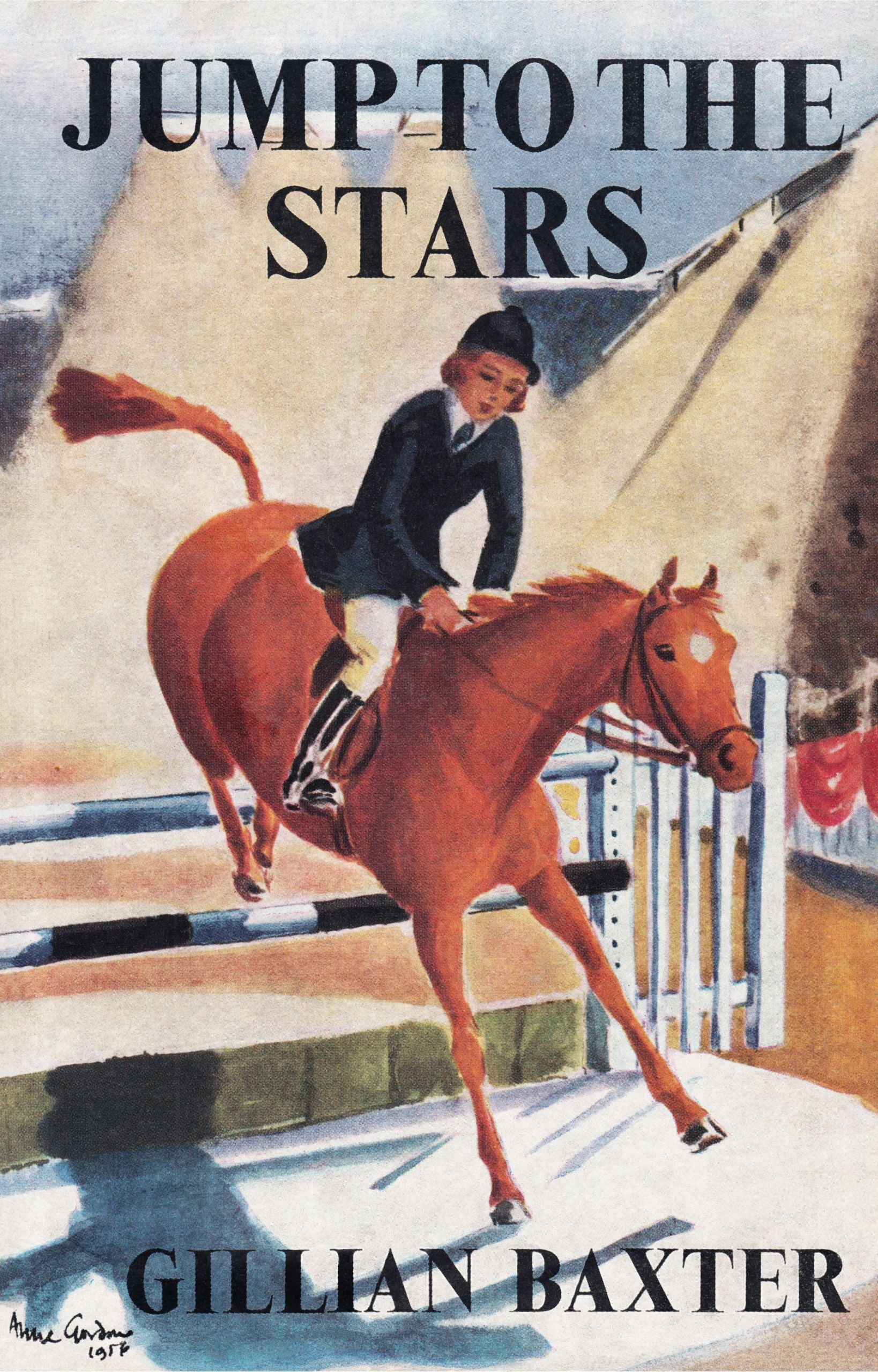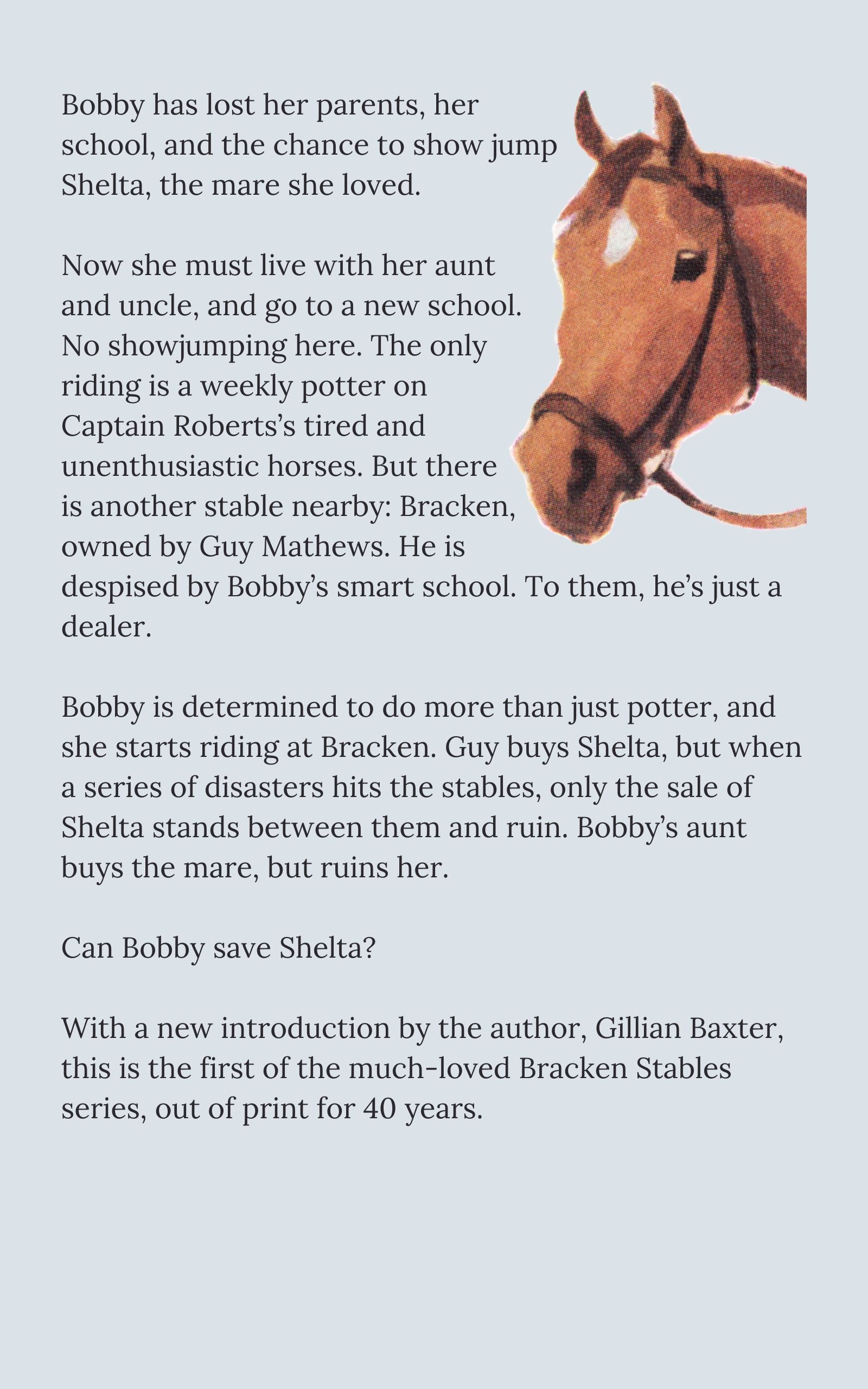Jane Badger Books
Gillian Baxter: Jump to the Stars (eBook - Bracken 1)
Gillian Baxter: Jump to the Stars (eBook - Bracken 1)
Couldn't load pickup availability
Share
At her last school, riding was on the curriculum, and Bobby used to ride Shelta, the chestnut Anglo-Arab mare for the school’s owners. All that has changed. The school’s owner was killed, the school has closed, and Shelta has been sold. Bobby is now living with her aunt and uncle, and has to go to a new school.
No showjumping here. The only riding is a weekly potter on Captain Roberts’s tired and unenthusiastic horses. But there is another stable nearby: Bracken, owned by Guy Mathews. He is roundly despised by the headmistress and the girls of Bobby’s smart school. Just a dealer. Selling useless horses.
Bobby is determined to do more than just potter, and she starts riding at Bracken. It’s nothing like it’s been painted – Guy wants to develop into a serious competition stable, and he buys Shelta when her new owner sends her to a sale. It’s a fight for Bobby to be allowed to ride her more than the once-a-a-week school thinks is acceptable, and even more to compete.
But when a series of disasters hits the stables, only the sale of Shelta stands between them and ruin. Bobby’s aunt buys the mare, but Helen is a cruel and bullying rider and soon ruins Shelta. With the mare set to be sent to yet another sale, can Bobby manage to save her?
With a new introduction by the author, Gillian Baxter, this is the first of the much-loved Bracken Stables series, out of print for 40 years.
Bracken Stables series 1
Page length: 192
Original publication date: 1957
How do I get my book?
How do I get my book?
There's a link to download in your confirmation email. If you need help, the email from Bookfunnel, who handle our delivery, will walk you through downloading the file that works best for you.
How do I read my eBook?
How do I read my eBook?
You can read the ebooks on any ereader (Amazon, Kobo, Nook), your tablet, phone, computer, and/or in the free Bookfunnel app.
Read a sample
Read a sample
“NOW, are you sure you haven’t forgotten anything, Ellen?” asked Mr. Camberwell, as his daughter threw her tennis racket into the back seat of the Sapphire Saloon, and climbed into the front seat beside him.
“Of course I haven’t,” replied Ellen. “But I expect Roberta has, as usual.”
“Have you, Roberta?” Mr. Camberwell asked his ward, who was already seated in the back of the car.
“I don’t think so,” replied Bobby, pushing away Ellen’s tennis racket, which had landed on her knees.
“Don’t forget that we are due at Lady Lawson’s for cocktails,” Helen Camberwell reminded her husband. “If we miss that, I shall never be able to live it down.”
“I’ll be back,” promised Mr. Camberwell, as the car slid forward. “Good-bye.”
“Good-bye, Mummy,” called Ellen, waving. “See you next holidays.”
“Good-bye, Aunt Helen,” called Bobby, almost too late, for Helen was nearly out of earshot.
As the car wound its way in and out of the Monday morning traffic, heading for Surrey, by way of Hammersmith and the Kingston Bypass, Bobby looked out of the window, wondering what her new school was going to be like, and wishing that she were returning to her old one, Highdene, in the Sussex Downs. If only Patrick Dawson had not been killed. He had run the big riding stables nearby in conjunction with his wife’s boarding-school, but after his death Mrs. Dawson had been unable to face running the school alone and it had closed down. Bobby, whose parents were both dead, had spent the Easter holidays with her second cousins, the Camberwells, at their London flat, and now she was to go to the same school as their daughter. True, she would still be able to ride, but only once a week, whereas at Highdene they had been able to ride almost every day, after school, and Bobby, who had been one of Pat Dawson’s best riders, had jumped his horses in shows for him, and had at last realised her ambition of winning a big open jumping class. Her favourite horse, a chestnut mare called Shelta, had been sold to a boy in Surrey, and Bobby’s one comfort was that, as her new school was also in Surrey, she might perhaps see Shelta occasionally.
They turned off the main road, and the car began to run through a series of quiet, green lanes, which climbed up and down hill like a switchback. Now the country was also changing, low, rolling hills, cloaked by trees, and the few fields were small and steep.
“This is Fern Dene,” announced Ellen, as they came to the outskirts of a small town, which was built mainly of grey stone, clustering round a small station, and a very old church. “The next village will be Bracken.”
They left the town behind, getting deeper and deeper into the hills. Bobby was delighted, and her spirits suddenly began to rise as she looked at the deep, green woods and the slow, quiet river which ran alongside the road. There were small farms and cottages among the trees, and Bobby wondered what the school would look like. She had imagined it as rather grim and dark, in the centre of a town. Somehow she had never expected it to be deep in woods, in hilly country such as this.
Then, at last, they were coming into the village of Bracken Hills. Now Bobby saw the reason for the name. All around the tiny station, which was the end of the line from Fern Dene, rose the hills, still covered in trees and deep, green young bracken. The station did not appear to be in the village itself, as the only house near it was a little pink washed cottage, just behind the station, and probably belonging to the stationmaster. Ellen was peering eagerly out of the window as they passed the station entrance, and as they drew level she told her father to stop.
“There’s Maureen,” she exclaimed. “We must give her a lift. She’s the head girl,” she explained to Bobby.
“Really, Ellen, I don’t think there’s room for anyone else,” said Mr. Camberwell. “Especially with her luggage.”
“Oh, she can leave that for the school car to fetch,” said Ellen airily. “That will be what she’s waiting for now. Maureen,” she yelled, winding down the window. “Come with us.”
The tall, fair-haired girl came forward to the car, smiling.
“Hello, Ellen,” she said. “I should adore a lift. I’ll leave my luggage for Thompson. He’s late, as usual.”
She hurried away to attend to her luggage, and Ellen turned to look at Bobby and the cluttered back seat.
“You’ll have to hold the tennis rackets, and those two coats.”
Obediently Bobby collected the things, and by the time Maureen returned the seat was clear. The head girl slid gracefully into the back seat, and Mr. Camberwell drove on.
“Did you have a good holiday?” inquired Ellen, sitting sideways so that she could look at Maureen.
“Oh, glorious,” replied Maureen. “We went to the South of France, you know. The weather was wonderful.”
“We stayed in London,” said Ellen. “It was quite entertaining. There were a lot of first nights, and we went to several premières.”
Bobby, who knew for a fact that Ellen had only been to three first nights, and one première, although her parents had attended dozens, kept quiet, as did Mr. Camberwell. Then Maureen’s attention turned to Bobby.
“So this is your cousin,” she said to Ellen. “Roberta Morton, I think you said.”
“Yes, that’s right,” agreed Ellen. “She rides, and so she will be going out with the Captain.”
“Second ride, of course?” asked Maureen.
“Oh yes. She has never owned a horse, like I do,” replied Ellen.
Bobbly, who was rapidly growing tired of being discussed as though she were not there, said, “I used to do quite a bit of jumping at my old school.”
“Oh, did you?” Maureen seemed faintly amused. “But of course Captain Roberts has very good horses. I don’t expect you’re used to thoroughbreds, are you?”
“Shelta, the mare I rode a great deal, is an Anglo Arab,” replied Bobby.
“Was she? How interesting.” Maureen did not sound as though she found it interesting at all. “And have you any other accomplishments besides riding? Do you dance at all? How many languages do you speak?”
“I’ve done a little ballroom dancing,” replied Bobby. “I can swim, and I can speak a bit of French and Gaelic.”
“How odd. Why Gaelic?” asked Maureen.
“There was a Scots girl at Highdene, my old school, who was a friend of mine,” explained Bobby. “She started to teach me.”
“Oh, I see.” Maureen lost interest, and she and Ellen started a discussion on their various friends and respective holidays and plans. Bobby stared out of the window and felt unnecessary. They were driving along a very narrow, tree-lined road. The trees met overhead, and it was almost dark, with the grey sky and the interlacing branches. Before long, however, they came out of the woods, into flatter country. The hills opened out, forming a small valley, and in it lay the village of Bracken Hills. It was small and pretty, and again was built of grey stone. Bobby saw a board saying:
BRACKEN HILLS RIDING STABLES.
HUNTERS, HACKS, AND PONIES FOR HIRE AND SALE.
LIVERIES TAKEN.
HORSES SCHOOLED. STALLION AT STUD.
Proprietor, G. MATHEWS.
“Is that where we ride?” she asked.
“There? Oh, no. Our stable belongs to Captain Roberts,” replied Ellen. “Mathews is an awful place. He deals in horses.” She sounded horrified at the idea of a dealer, but Bobby was fascinated. She loved looking around a dealer’s yard, as there was usually such a mixed collection of horses there.
They drove straight through the village, and then Ellen said, “This is Bracken House.”
Bobby looked eagerly out of the window. She saw a long red brick wall, with the tops of trees showing over it, and then a pair of wrought-iron gates, which stood wide open. There was a gravelled drive leading towards a high, square red brick house. At the side of the gate stood a board, which read, “Bracken House School for Girls.”
“Well, back to prison,” said Mr. Camberwell jovially, as he turned the car through the gateway.
There was a rather shocked silence from Maureen, and Ellen said, “Really, Daddy.” Bobby, who thought it a rather apt remark, did not risk saying so. The car crunched up the drive, with Bobby staring in horror at the grim house. The grounds were flat, with neatly grouped trees, and on one side of the house were the tennis courts. The car stopped outside the front door, and a woman dressed in a plain, dark frock came down the steps.
Ellen got out, and Bobby followed Maureen, while Mr. Camberwell helped with the luggage, and a uniformed porter followed the woman down the steps to take it.
“Good afternoon, Mr. Camberwell,” the woman was saying. “Hello, Maureen and Ellen. This is Roberta, I suppose? I am Matron. I hope you will be happy here.”
Then Mr. Camberwell said good-bye and wished Bobby luck, before getting back into his sleek car, and hurrying home to his wife and the cocktail party.
Ellen and Maureen disappeared, and Matron showed Bobby her room, which she would share with another girl. Bracken House was not a big school, but was very exclusive, and Bobby had been accepted because of the Camberwells, as Mrs. Camberwell had been at the House before her daughter.
Bobby wandered across to the window and leaned out. The sky was grey and dull, the grounds looked bleak and depressing, and the hills which she had admired were out of sight. Bobby sighed and turned back to her room. It was painted cream, with dark green woodwork, and green curtains. The floor was covered in green linoleum, and there was a green and brown rug beside each bed. A dark wood chest of drawers, a dressing-table, and two divan type beds completed the furnishings. The beds both had green covers, and the dressing table had a green mat. Bobby thought of her room at the house in Sussex, where she had lived until her father died, eighteen months before. Her mother had died when she was very small. The room had been in the roof, with a sloping ceiling, bright, patterned curtains, lino, and rugs, pictures on the walls, and photographs on the dressing-table, a bridle hung on the end of the bookcase, and an old, bent stirrup iron on the mantelpiece. Then there had been her bed in the light, airy room at Highdene, and the big, wooded grounds, in which stood the stables, and where they had had the jumping paddock, and the school.
Bobby began to unpack, placing two photographs of horses on the chest of drawers, and one of her parents on the dressing table. Three had been the number of photographs allowed at her old school. One photograph was of Bobby jumping a good-looking horse over the Road Closed in a show, and the other of the same mare standing in the yard after a show, with a dark sweat mark where the saddle had been, and wearing a snaffle bridle on which was tied two rosettes.
Bobby was folding clothes and putting them into the two drawers when a girl came in, followed by the porter, who carried her luggage. The two girls grinned at each other. Bobby’s new companion was a small, slim, mousey haired girl of about fifteen, with a shy smile. She wore the school uniform, of white blouse, grey skirt, and tan shoes, and carried the uniform grey coat.
“Hello. I’m Roberta Morton,” said Bobby.
“My name is Silvia Wheatley,” replied the other girl, deciding that this brown-haired vivacious girl looked rather nice.
“Are you new as well?” asked Bobby.
“Yes,” replied Silvia.
“These are your drawers,” Bobby told her. “I hope you don’t mind me taking these first. I don’t know how many photographs we’re allowed, but I’ve put three. That’s the number we had at my last school.”
“Have you been away to school before, then?” asked Silvia.
“Yes, it was lovely,” replied Bobby. “I don’t think this looks so good, though.”
“I think it looks horrible,” said Silvia. “I’ve never been away to school before, but Granny thought it was time I did.”
“Haven’t you any parents?” asked Bobby. “I haven’t.”
“No. They died when I was small,” answered Silvia. “I don’t really remember them at all.”
The two girls went on unpacking. They had just finished when a bell rang, and Bobby said, “I should think that’s lunch.”
“Oh, good. I’m hungry,” said Silvia.
“Come on, then,” Bobby opened the door and shot out into the corridor, barging straight into someone coming the other way.
“Really,” said a voice. “I don’t know what young girls are coming to. You must learn to conduct yourself correctly.”
“I’m sorry,” said Bobby, looking up at the tall, thin woman. “I didn’t see you.”
“So I noticed,” replied the woman.
She had short grey hair, in an Eton crop, and a long nose. She was well made up, and wore a dark costume in a heavy material.
“Could you tell me what that bell was for?” asked Bobby.
“It was to tell the girls that I wish to speak to them in the hall,” was the reply. “I am Miss Wilson.”
“Oh, I’m sorry,” said Bobby. Miss Wilson was the head-mistress.
“If you will follow me I’ll show you the way,” the head told them, rather coldly.
She led the way down the corridor, and Bobby and Silvia followed. They went past closed doors, and passed some girls who greeted the head with a respectful, “Good morning, Miss Wilson.” Then they went down a wide flight of oak stairs, across a dark, oak-panelled hall, through a door, and across the main hall. It was full of girls, sitting in rows on hard chairs in almost complete silence. Several mistresses sat behind them, and everyone rose as Miss Wilson appeared. Bobby and Silvia slid into two empty chairs, and Miss Wilson made her way to the platform.
“Good morning girls,” she began.
“Good morning, Miss Wilson,” came the reply.
Everyone sat down, and Miss Wilson started to speak. She talked for about half an hour, reading the rules for the benefit of the new girls, and horrifying Bobby with the number, and naming the form captains, games captain, and head girl, Maureen Forbeson, who was sitting in the front row with the rest of the prefects. Bobby spotted Ellen in the row behind the prefects, and as close to Maureen as she could get. Miss Wilson went on to explain the times of extra classes, such as music, elocution, dancing, and swimming, which would be on alternate Saturdays. Then she talked about outings to museums, ancient houses, and factories, and finally she came to riding. Bobby sat up and took notice, and Silvia seemed slightly more interested.
“Riding will be on Saturday mornings, from ten until eleven for the good riders, and from eleven to twelve for the beginners and new girls. This is arranged so that the good riders will have exercised the horses before the novices ride them. Captain Roberts will allot you each a horse, and you will ride that horse for the rest of the term, unless he finds it necessary to change you round. You will not ride if it is wet, and there will be indoor games instead. That is all. Lunch will be in the dining-hall in ten minutes. You may go and get ready.”
“Help,” gasped Bobby, as she and Silvia made their way back to their room. “No riding if it’s wet, and on well-exercised horses. How horrible.”
Who's in the book?
Who's in the book?
Humans: Roberta (Bobby) Morton, Ellen, Roger, Charles and Helen Camberwell, Guy Mathew, Heath Graham, Silvia Wheatley, Miss Wilson
Equines: Shelta, Sergeant, Goldcrest, Pink Froth, Coffee, June Evening, Silver Fountain
Other titles published as
Other titles published as
Series order
Series order
1. Jump to the Stars
2. The Difficult Summer
3. The Perfect Horse


I read this novel when I was 11 years old and it was just as exciting, and enjoyable, when I re-read it at 65! If anything I am even fussier about the quality of writing than I was, as a teen, and Gillian Baxter was probably one of the reasons why any book I read must use good writing, great vocabulary and a strong storyline if it is to hold me.
Loved reading this book, love all Gillian Baxter books. Just about to start reading Love and Horses at Bracken.
It’s wonderful to read the full, unabridged version of this novel, one of my favourite pony books. The paperback I had as a child had been heavily edited. Jane Badger Books brings you the complete versions of old favourites. I highly recommend this website. The books are easy to download, too.


